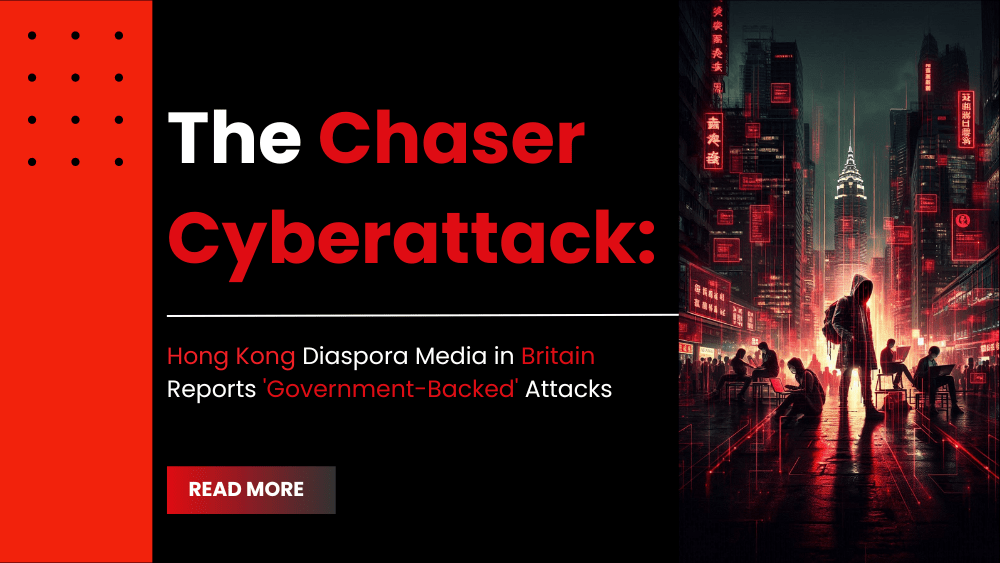The Chaser, a news website run by Hong Kong journalists based in Britain, has revealed that Google alerted them to a “government-backed” cyberattack targeting their company email. While China is widely presumed to be behind the attack, Beijing has vehemently denied any involvement. The incident underscores the escalating challenges faced by Hong Kong journalists, both within the territory and in exile.
Google Warns of “Government-Backed” Attack
On Tuesday, The Chaser published a detailed report on their website, including a screenshot of the email received from Google. The email categorized the severity of the attack as “high,” noting that only 0.1% of users worldwide have been subjected to similar attacks. Google acknowledged the possibility of a false alarm but stated that they had detected suspicious activities. These activities could include attempts to steal passwords or personal information through emails containing malicious attachments, harmful software download links, or links to fake websites.
The Chaser Responds to Cyberattack
The Chaser, in a statement, expressed their concern, stating, “At a time when Hong Kong’s press is mired in the White Terror, the invisible black hand has unscrupulously reached out to the diaspora media overseas.” They emphasized their commitment to press freedom, declaring,
“Our team members are from Hong Kong and came to the UK three years ago, hoping to continue chasing news on free soil. In today’s turbulent world of press freedom in Hong Kong, there is no way out. Our team strongly condemns all threats to press freedom and pledges to remain at our posts.”
China Denies Involvement
Despite attempts to reach out to China’s Embassy in Britain for comment, VOA was unsuccessful. However, the Chinese Embassy in Washington issued a statement denying any involvement in the cyberattack.
They asserted, “China firmly opposes and cracks down on all forms of cyberattacks in accordance with law. Without valid evidence, they jumped to an unwarranted conclusion and made groundless accusations against China.” The embassy labeled the accusations as “extremely irresponsible and a complete distortion of facts.”
A Pattern of Pressure
This incident follows a previous report by The Chaser, published last month, which alleged that the Chinese Embassy in Britain had pressured Dragons Teaching, a British publishing house, to remove the phrase “Republic of China” from chapters about Taiwan in Chinese textbooks. The publishing house ultimately yielded to pressure from Beijing, according to The Chaser’s investigation. These textbooks are used in secondary school exams in Britain. The Chinese Embassy in Britain has declined to comment on this report, despite its coverage by other British media outlets.
Growing Pressure on Hong Kong Journalists
The cyberattack on The Chaser comes amidst a climate of increasing pressure on journalists in Hong Kong. The Hong Kong Journalists Association reported that from June to August of this year, dozens of journalists, their families, employers, landlords, and neighbors faced unprecedented harassment and intimidation through online and offline means.
Benson Wong, a Hong Kong political scholar residing in Britain, believes the attacks on The Chaser and other Hong Kong journalists are not coincidental, particularly as China’s National Day approaches.
He stated, “From their point of view, it is understandable that the national security and intelligence units would do some things or do some ‘homework’ as part of their performance.”
He interprets the attack as a message that Hong Kong journalists who criticize China cannot expect to be safe from interference or attacks, even when they relocate overseas.
VOA has reached out to Britain’s National Cyber Security Center for comment on the attack but has yet to receive a response.
The Chaser’s experience highlights the growing challenges faced by Hong Kong journalists seeking to operate freely, both within Hong Kong and abroad. The cyberattack serves as a stark reminder of the lengths to which China is willing to go to suppress dissent and control information. The international community must remain vigilant in defending press freedom and holding China accountable for its actions.









